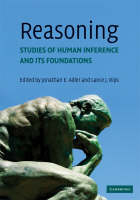
Reasoning
Cambridge University Press (Verlag)
978-0-521-61274-6 (ISBN)
This interdisciplinary work is a collection of major essays on reasoning: deductive, inductive, abductive, belief revision, defeasible (non-monotonic), cross cultural, conversational, and argumentative. They are each oriented toward contemporary empirical studies. The book focuses on foundational issues, including paradoxes, fallacies, and debates about the nature of rationality, the traditional modes of reasoning, as well as counterfactual and causal reasoning. It also includes chapters on the interface between reasoning and other forms of thought. In general, this last set of essays represents growth points in reasoning research, drawing connections to pragmatics, cross-cultural studies, emotion and evolution.
Jonathan E. Adler is Professor of Philosophy at Brooklyn College and the Graduate School, City University of New York. His D.Phil. in philosophy is from Oxford University. His main areas of research are epistemology, philosophy of psychology, informal logic, ethics, and philosophy of education. In 2002, he published Belief's Own Ethics. Lance Rips received his Ph.D. from the Psychology Department at Stanford University in 1974 and taught at the University of Chicago from 1974 to 1993. Since 1993, Rips has been a Professor of Psychology at Northwestern University. He is on the editorial board of Cognition, Public Opinion Quarterly, and Informal Logic.
Preface; List of contributors; Introduction: philosophical foundations; Part I. Foundations of Reasoning: Section 1. Some Philosophical Viewpoints: 1. Change in view: principles of reasoning; 2. Belief and the will; 3. Internal and external reasons; 4. Paradoxes; Section 2. Fallacies and Rationality: 5. When rationality fails; 6. Extensional versus intuitive reasoning: the conjunction fallacy in probability judgment; 7. Can human irrationality be experimentally demonstrated?; 8. Breakdown of will; Part II. Modes of Reasoning: Section 3. Deductive Reasoning: 9. Logical approaches to human deductive reasoning; 10. Mental modes and deductive reasoning; 11. Interpretation, representation, and deductive reasoning; 12. Reasoning with quantifiers; 13. The problem of deduction; Section 4. Induction: 14. Patterns, rules, and inferences; 15. Inductive logic and inductive reasoning; 16. Reasoning in conceptual spaces; 17. Category-based induction; 18. When explanations compete: the role of explanatory coherence on judgments of likelihood; 19. Properties of inductive reasoning; Section 5. Dual and Integrative Approaches: 20. Human reasoning and argumentation: the probabalistic approach; 21. Individual differences in reasoning and the algorithmic/intentional level distinction in cognitive science; 22. Reasoning, decision making, and rationality; Section 6. Abduction and Belief Change: 23. Defeasible reasoning; 24. Explanatory coherence; 25. Belief revision; 26. Belief, doubt, and evidentialism; 27. Reflections on conscious reflection: mechanisms of impairment by reasons analysis; 28. Belief change as propositional update; Section 7. Causal and Counterfactual Reasoning: 29. Causal thinking; 30. Causation; 31. Propensities and counterfactuals: the loser that almost won; Section 8. Argumentation: 32. The layout of arguments; 33. The skills of argument; 34. Reasoning and conversation; Part III. Interactions of Reasoning in Human Thought: Section 9. Reasoning and Pragmatics: 35. Specificationism; 36. Presupposition, attention, and why-questions; 37. Further notes on logic and conversation; 38. The social context of reasoning: conversational inference and rational judgment; Section 10. Domain-Specific, Goal-Based, and Evolutionary Approaches: 39. Domain-specific knowledge and conceptual change; 40. Pragmatic reasoning schemas; 41. Beyond intuition and instinct blindness: toward an evolutionarily rigorous cognitive science; 42. Use or misuse of the selection task? Rejoinder to Fiddick, Cosmides, and Tooby; 43. Why we are so good at catching cheaters; 44. The modularity of mind: an essay on faculty psychology; 45. Commitment Brian Skyrms; 46. Evolution of inference; Section 11. Reasoning across Cultures: 47. Reasoning across cultures; 48. Culture and systems of thought: holistic versus analytic cognition; 49. On the very idea of a conceptual scheme; 50. The truth in relativism; Section 12. Biology, Emotions, and Reasoning: 51. Logic and biology: emotional inference and emotions in reasoning; 52. Distinct brain loci in deductive versus probabilistic reasoning; 53. The emotional dog and its rational tail: a social intuitionist approach to moral judgment; Index.
| Erscheint lt. Verlag | 5.5.2008 |
|---|---|
| Verlagsort | Cambridge |
| Sprache | englisch |
| Maße | 177 x 254 mm |
| Gewicht | 1820 g |
| Themenwelt | Geisteswissenschaften ► Psychologie ► Allgemeine Psychologie |
| ISBN-10 | 0-521-61274-8 / 0521612748 |
| ISBN-13 | 978-0-521-61274-6 / 9780521612746 |
| Zustand | Neuware |
| Haben Sie eine Frage zum Produkt? |
aus dem Bereich


